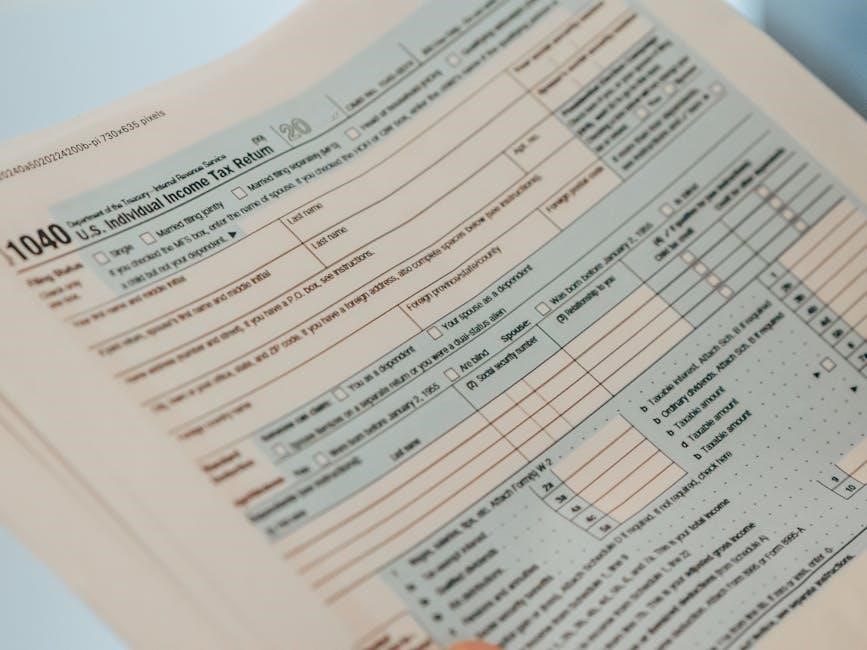Free government laptop programs aim to bridge the digital divide by providing essential technology to low-income families, students, and individuals in need, fostering education and employment opportunities.
Overview of Government Assistance for Digital Accessibility
Government assistance programs for digital accessibility aim to reduce the technology gap by providing free or low-cost laptops to low-income families, students, veterans, and disabled individuals. These initiatives, often partnered with non-profit organizations, ensure equitable access to essential tools for education, employment, and online resources. Programs like SNAP and Medicaid eligibility can qualify individuals for such benefits, enabling them to acquire refurbished or subsidized laptops. This support fosters inclusivity and empowers marginalized communities to participate fully in the digital economy, bridging the divide between technological haves and have-nots. Free government laptops are a cornerstone of these efforts, promoting socio-economic mobility and digital literacy.
Importance of Technology for Education and Employment
Technology plays a pivotal role in modern education and employment, enabling access to online resources, digital classrooms, and remote work opportunities. For students, laptops facilitate research, homework, and collaboration, while for job seekers, they provide tools for skill development, job searches, and professional networking. Without access to technology, individuals face significant barriers to education and employment, perpetuating socio-economic disparities. Free government laptops help bridge this gap, ensuring equitable opportunities for learning and career advancement. By empowering individuals with essential tools, these programs foster digital literacy and independence, crucial for thriving in today’s technology-driven world. Technology accessibility is no longer a luxury but a necessity.

Eligibility Criteria for Free Government Laptops
Eligibility for free government laptops typically requires meeting income limits, household size thresholds, and participation in government assistance programs like SNAP or Medicaid. Special criteria may apply for veterans and disabled individuals.
Income Requirements and Household Size Limits
Eligibility for free government laptops often depends on income requirements, typically set at 200% of the Federal Poverty Level (FPL) or 60% of the Area Median Income (AMI). Household size is also a factor, with limits adjusted based on the number of family members. For example, a household of four may qualify if their income does not exceed $53,000 annually. Income documentation, such as tax returns or pay stubs, is usually required to verify eligibility. These limits ensure the program targets low-income individuals and families, helping them access essential technology for education and employment. Requirements may vary by state and program.
Participation in Government Assistance Programs
Participating in government assistance programs like SNAP, Medicaid, or the Affordable Connectivity Program (ACP) often qualifies individuals for free government laptops. These programs are designed to support low-income families and individuals, ensuring access to essential technology. Eligibility is typically determined by enrollment in such programs, which may also offer additional benefits like discounted internet services. Each program has specific requirements, but they generally aim to help bridge the digital divide. By leveraging these initiatives, individuals can gain access to laptops and other digital tools without needing to submit separate applications, streamlining the process for those already receiving government aid.
Special Considerations for Students, Veterans, and Disabled Individuals
Students, veterans, and disabled individuals often receive special consideration when applying for free government laptops. Many organizations, such as Computers With Causes and World Computer Exchange, prioritize these groups to ensure equal access to technology. Students may need a letter from their school, while veterans can provide military documentation. Disabled individuals and low-income families also qualify under specific programs. These initiatives aim to bridge the digital divide and provide tools for education, employment, and personal development; Tailored eligibility criteria and streamlined application processes are often available for these groups, making it easier to access essential technology and participate fully in the digital world.

Organizations Offering Free Laptops
Organizations like Accelerated Schools Program, Computers With Causes, and World Computer Exchange provide free laptops to low-income families, students, and veterans, bridging the digital divide.
Accelerated Schools Program
The Accelerated Schools Program provides free laptops to students from low-income families, ensuring access to digital tools for education. Eligibility is often determined by household income and participation in government assistance programs. Applications are typically submitted by school administrators on behalf of students, requiring proof of eligibility and a signed letter of request. This initiative aims to support academic success and bridge the technology gap for underserved communities, offering refurbished laptops to those who cannot afford them. The program emphasizes educational equity, enabling students to complete assignments, access online resources, and stay competitive in a digital world.
Computers With Causes
Computers With Causes is a nonprofit organization dedicated to providing free laptops to individuals in need, including students, low-income families, veterans, and the disabled. Eligibility is based on financial hardship and participation in government assistance programs. To apply, individuals must complete an online application form, providing proof of income and a brief explanation of their need. The organization prioritizes educational purposes, ensuring recipients can access digital tools for learning and career development. Computers With Causes also partners with other nonprofits to expand its reach, offering refurbished laptops to bridge the technology gap and empower underserved communities nationwide.

World Computer Exchange

World Computer Exchange is a nonprofit organization that provides refurbished laptops to individuals and families in need, with a focus on supporting education and digital inclusion. Eligibility is typically based on income level, participation in government assistance programs, or enrollment in educational institutions. To apply, individuals must complete an online application form, which may require documentation such as proof of income or a letter from a school or nonprofit organization. The program prioritizes students, low-income families, and those who lack access to technology for educational purposes. World Computer Exchange also collaborates with other organizations to maximize its reach and impact.

Application Process for Free Government Laptops
Research eligible programs, complete the application form accurately, submit required documents, and await approval. Some programs may require additional steps like attending information sessions or providing references.
Steps to Complete the Application Form
Research the program and ensure eligibility.
Navigate to the official website or organization offering the free laptop.
Locate and access the application form, typically online.
Fill in all required fields accurately, including personal and household information.
Upload or attach necessary documentation, such as proof of income, identification, and enrollment letters.
Review the form for errors or missing information.
Submit the application electronically or in-person, depending on the program’s requirements.
Wait for confirmation and follow up if additional steps are needed.
Steps may vary slightly depending on the organization or program.

Required Documentation for Submission
To apply for a free government laptop, you typically need to provide proof of income, such as pay stubs or tax returns, as well as a valid government-issued ID. Additional documents may include proof of participation in government assistance programs like SNAP or Medicaid, a letter from your school if you’re a student, and proof of residency, such as a utility bill or lease agreement. Citizenship or residency status may also be required, potentially including a birth certificate or Social Security card. It’s advisable to check the specific requirements on the application website and gather all necessary documents beforehand to ensure a smooth process.
How to Submit Your Application
To submit your application for a free government laptop, visit the organization’s official website or contact local community centers for assistance. Most programs offer online application forms that can be completed and submitted electronically. Ensure all required fields are filled accurately and attach necessary documentation, such as proof of income or participation in government assistance programs. Some organizations may allow submissions via mail or in-person at designated locations. Once submitted, applications are reviewed for eligibility, and approval notifications are typically sent via email or mail. Processing times vary, so applicants are advised to follow up if they do not receive a response within the specified timeframe. Additionally, some programs may require attending informational sessions or workshops as part of the application process. After approval, laptops are distributed through designated events or shipped directly to the applicant. Be sure to review the program’s guidelines for any additional steps or requirements after submission. Overall, the submission process is designed to be accessible and straightforward, ensuring eligible individuals can easily apply and receive the necessary technology to support their educational and professional goals. The organizations often provide detailed instructions on their websites to help applicants navigate the process smoothly. By following the steps carefully and providing all required information, applicants can efficiently complete their submission and move closer to obtaining a free laptop. This initiative aims to reduce barriers to digital access, enabling individuals to fully participate in today’s technology-driven world. The programs are particularly focused on supporting low-income families, students, veterans, and disabled individuals, ensuring they have the tools needed to succeed in education and employment. Many organizations also offer additional resources, such as low-cost internet plans and technical support, to complement the laptop program and provide comprehensive assistance. By leveraging these resources, participants can maximize the benefits of their new technology and improve their overall quality of life. The application process is a critical first step toward bridging the digital divide and empowering individuals with the tools they need to thrive in modern society. Organizations like PCs for People and Computers With Causes have streamlined their application processes to make it easier for eligible individuals to apply and receive their free laptops; These programs are essential for creating a more inclusive digital landscape and ensuring that everyone has access to the technology necessary for success. By submitting an application, individuals are taking an important step toward improving their access to education, employment opportunities, and essential online services. The submission process is designed to be user-friendly, with clear instructions and support available for those who need assistance. This ensures that even individuals with limited technical expertise can navigate the application process confidently. Overall, the goal of these programs is to provide a pathway to digital inclusion, enabling individuals to overcome financial barriers and fully engage with the digital world. The submission of an application is a key part of this process, and organizations are committed to making it as straightforward and efficient as possible. By providing free laptops and related resources, these programs are helping to level the playing field and create new opportunities for those in need. The submission process is just the beginning of a journey toward greater digital accessibility and empowerment.
Top Laptop Models Provided by Government Programs
Government programs often provide refurbished laptops like the Acer Chromebook 311, ideal for basic tasks, to eligible recipients, ensuring access to essential technology.
Acer Chromebook 311
The Acer Chromebook 311 is a popular model often provided through government laptop programs. It features an 11.6-inch HD display, lightweight design, and long battery life, making it ideal for students and basic tasks. With a MediaTek processor and 4GB RAM, it efficiently handles web-based applications and educational tools. The Chromebook is designed for portability and durability, suitable for low-income families and individuals needing reliable access to technology. Many government programs offer refurbished Acer Chromebook 311 devices, ensuring affordability and accessibility for those who qualify. This model is widely recognized for its performance and value in supporting education and digital inclusion initiatives.
Other Popular Models Offered
Beyond the Acer Chromebook 311, other popular models provided by government programs include the HP Stream 11, Lenovo Chromebook 300e, and Dell Inspiron 15 3000 series. These laptops are chosen for their affordability, durability, and suitability for web-based tasks. The HP Stream 11 offers a compact design with decent performance for education and basic productivity. The Lenovo Chromebook 300e is known for its rugged build, making it ideal for students. The Dell Inspiron 15 3000 series provides a larger screen and more powerful specs, suitable for multitasking. These models are frequently refurbished and distributed to ensure accessibility for low-income individuals, supporting their educational and professional needs effectively.
Additional Resources and Assistance
Beyond free laptops, programs offer low-cost internet services and refurbished devices. Organizations like PCs for People and Computers With Causes provide further tech support and digital literacy training.
Low-Cost Internet Programs for Laptop Users
Low-cost internet programs are essential for maximizing the benefits of free government laptops. Programs like the Affordable Connectivity Program (ACP) and Emergency Broadband Benefit (EBB) offer discounted internet services to eligible households. These initiatives ensure that individuals can afford reliable connectivity, making their laptops functional tools for education, employment, and daily life. Many providers participate in these programs, offering reduced monthly rates or even free services. Eligibility is often tied to participation in government assistance programs like SNAP or Medicaid. Applying for these programs typically requires proof of eligibility and completing a simple application form online or through a participating provider.
Non-Profit Organizations Offering Tech Support
Non-profit organizations play a vital role in supporting users of free government laptops by providing essential tech support. Groups like Computers With Causes and World Computer Exchange not only distribute devices but also offer training and maintenance services. These organizations ensure that recipients can effectively use their laptops for education, employment, and daily tasks. Additionally, they often provide troubleshooting assistance, helping users overcome technical challenges. Such programs are crucial for individuals who may lack the resources to access professional tech support. By bridging this gap, these non-profits empower users to maximize the benefits of their free government laptops and stay connected in the digital world.

Free government laptop programs are a vital resource for bridging the digital divide, empowering individuals with essential tools for education, employment, and connectivity, ensuring equal opportunities for all.
Benefits of Participating in Government Laptop Programs
Participating in free government laptop programs offers numerous benefits, including enhanced educational opportunities for students, improved employability for job seekers, and better access to essential online resources; These programs bridge the digital divide, enabling low-income individuals and families to stay connected and competitive in today’s tech-driven world. Additionally, they provide tools for remote learning, job training, and digital communication, fostering independence and self-sufficiency. By ensuring everyone has access to modern technology, these initiatives promote social equity and long-term economic growth, helping participants achieve their full potential in an increasingly digital society.
Future of Digital Accessibility Initiatives
Future digital accessibility initiatives aim to expand programs like the Affordable Connectivity Program (ACP) and refurbishment efforts by organizations such as PCs for People. These programs will focus on providing affordable technology and internet access to underserved communities. Collaboration between government agencies, nonprofits, and private sectors will enhance the reach and efficiency of these initiatives. The goal is to ensure that everyone, regardless of income, has access to essential technology, promoting digital inclusion and bridging the gap between socioeconomic divides. Sustainability and scalability will be key priorities, ensuring long-term success and adaptability to evolving technological needs.
